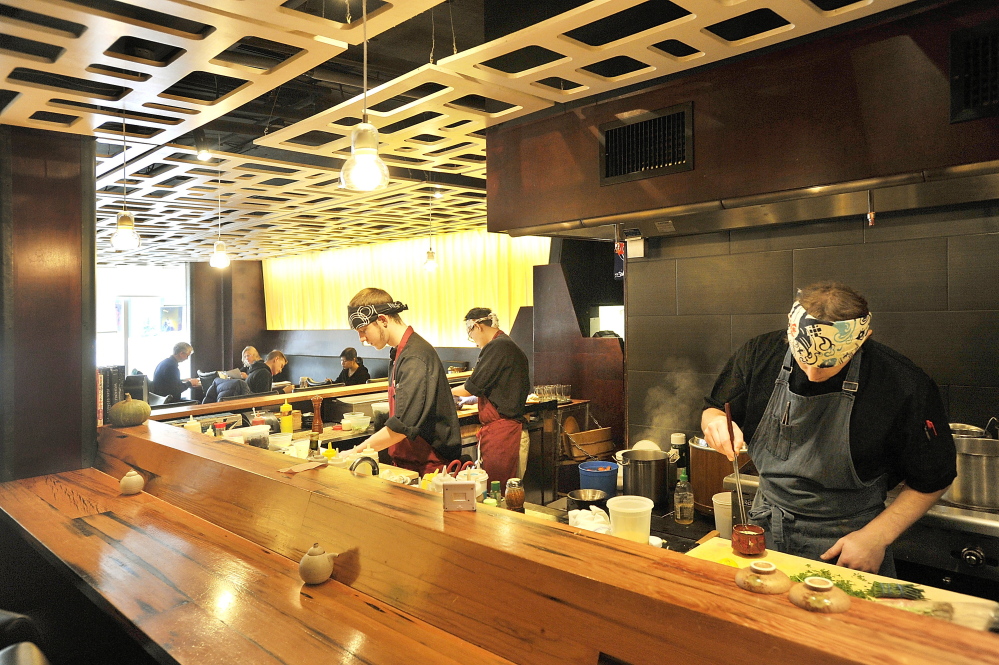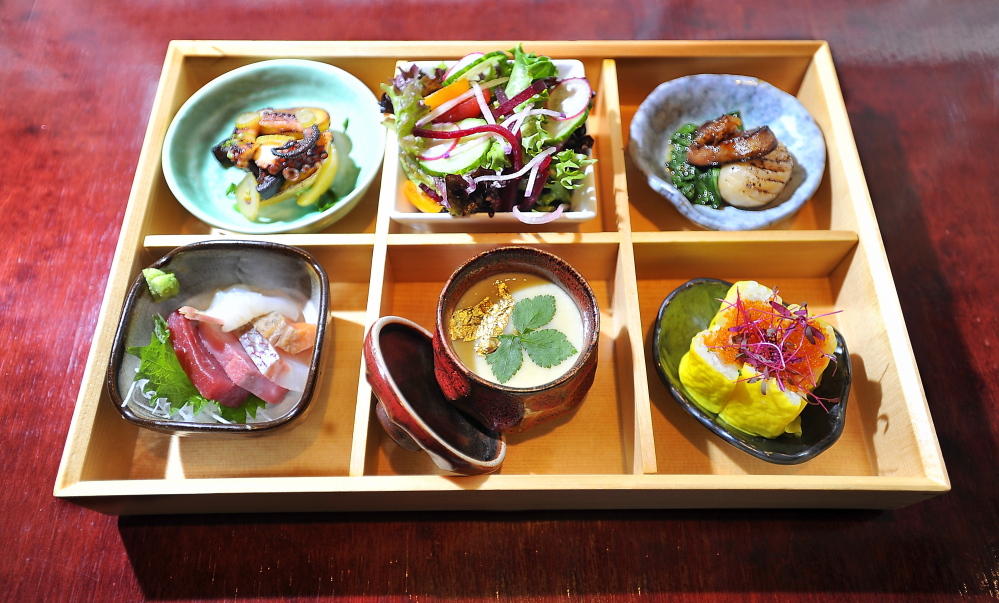Japanese food – like politics, opera and crunchy peanut butter – evokes strong passions. Admirers prize the flavors of seaweed and sake, and extol the health benefits of sushi and sashimi. Detractors blanch at the mention of uncooked fish and cringe at the thought of sea urchin roe.
Well, there’s good news in the Old Port for both. Miyake on Fore Street offers extraordinary food that’s informed by Japanese tradition, not stifled by it, and so varied that both sushi lovers and carnivores can dine here with enthusiasm. It’s no surprise that owner Masa Miyake was a James Beard Award semifinalist for best chef in the Northeast last year. His food is just that good.
Take his braised pork belly, which appears on the menu two ways: solo with a smear of spicy-hot Japanese mustard on the side ($8), or paired with a celery root puree. Cutting pork belly with chopsticks can be challenging, so I speared a slice to lift it – chopsticks etiquette be damned – from the plate and nibble around the edges. He had me from hello. Miyake’s pork is tender and juicy with wonderful depth of flavor, and the crown of fat on top melts instantly on the tongue. (It’s hard to say which of the two versions is better, but the way the velvety puree enhances the rich meat gives that one a slight edge.) When the waitress asks if you’d like anything special in your six-part lunchtime bento box ($18), insist on the pork.
If you need a light complement, order the seaweed salad ($5). Like all of the food here, it’s eye-catching – glistening ribbons of vibrant, green seaweed tossed with sesame seeds and flakes of crushed red pepper that add flashes of crimson and a spark of heat. The presentation and the seasoning are spot on, while the texture is at once crunchy and supple. And just when you worry that you’re going to finish the salad too soon, you uncover thin slices of ultra-crisp cucumber mixed with sesame dressing at the bottom of the dish. When our waitress came by to see if we needed anything, I had to shake my head; I was too busy munching to offer an articulate reply.
A different kind of seaweed makes an appearance in a tofu appetizer that pairs stacks of bean curd and sliced avocado with thin fronds of black hijiki seaweed and purple amaranth sprouts. I admired the array of colors, then savored the flavors: the tofu and avocado cool and almost buttery, the hijiki (which reminds me of slightly undercooked wild rice) both nutty and starchy. You’ll either love hijiki or you won’t. I loved it.
Masa Miyake grew up in Japan and trained in Tokyo and New York before opening his first Maine restaurant in 2007. Three years later he opened Pai Men Miyake on Longfellow Square. (The short-lived Miyake Diner opened – and closed – last year.) He says that his cooking incorporates classical Japanese ingredients and techniques, but also reflects years of studying Italian and French cuisine. “I love Italian cooking … it is quite simple,” he tells customers on the restaurant website, but Japanese dishes such as clams in miso soup remain personal favorites because they represent “a perfect balance of flavors.” In fact, balance is the essential factor in all of his cooking. There’s only one goal for the food at Miyake, he says: “Being delicious.”
The house-cured duck is that and more. Served with a buerre blanc sauce enriched with uni or sea urchin roe, the duck is melt-in-your-mouth tender, and the orangey, silky sauce both salty and sweet. Pairing duck with uni, which tastes like the creamy cousin of a just-shucked oyster, may sound curious, but it works – memorably. It’s a good thing that this, and many of the dishes at Miyake, are modest in size, as moderate portions mean you can taste several different dishes. Still, caveat emptor: Dining at Miyake can be expensive, and ordering a la carte is definitely pricey. The good news is that both lunch and dinner menus include multi-course tasting options that are more reasonable ($19.50 for three courses, including miso soup, at lunch, $30 to $50 for multiple courses at dinner.) For food of this quality, the multi-course menus are a bargain.
So you’re wondering about sushi and sashimi and the raw fish that divides us? It, too, is outstanding, whether you tuck into a dinner selection chosen by the chef (called Omakase and priced from $38 to $65) or try the standard selection in the midday bento box. Tuna and salmon are predictably good, but hamachi, or yellowtail, is over-the-top flavorful with a delicate and distinctly sweet aftertaste.
If you simply can’t stomach the thought of plain, uncooked fish, remember that you can dip the slivers into soy sauce flavored with fiery wasabi – or try it folded into one of Miyake’s rice and vegetable rolls ($10). And if you’re committed to eating local, know that 50 percent of the seafood at the restaurant comes from local waters, and most of the seasonal offerings are sourced from Miyake’s own farm in Freeport, or from other local farmsteads. Feeling adventurous but rigorously anti-raw? Try unagi, small bundles of eel that are slathered with a sweet sauce and grilled until crispy on the outside and succulent within – very rich and very satisfying. In Japan, they’re said to provide strength on steamy summer days. They work just as well in Maine when snow is piling up outside the windows on Fore Street.
A few friends who have peered through those windows asked if Miyake was “precious”? I wondered the same thing until I walked inside and heard the Talking Heads playing loudly on the sound system. Precious it’s not. The interior is contemporary and the design choices are restrained (smooth pebbles, for example, serve as chopstick rests), but the vibe is casual and the well-informed, young servers welcome any and all questions.
Miyake isn’t perfect. Both times that I visited the grilled salmon shioyaki, normally one of my favorites, was dry and the miso soup (served as part of the multi-course menu) arrived at the table lukewarm. (One friend also noted that the sliced ginger offered with several of his dishes was distinctly tired.) But those are isolated bumps along an otherwise exceptional journey.
Miyake contributes a handful of superlative Japanese options to the Portland food scene. And that’s something about which all of us can feel passionate.
James H. Schwartz has covered food, travel and architecture for The Washington Post, Downeast, Coastal Living and Southern Living magazines for more than 30 years. Long a commuter between Portland and Washington, D.C., he retired from his job as vice president at the National Trust for Historic Preservation in 2013 and relocated to Maine.
Send questions/comments to the editors.




Comments are no longer available on this story